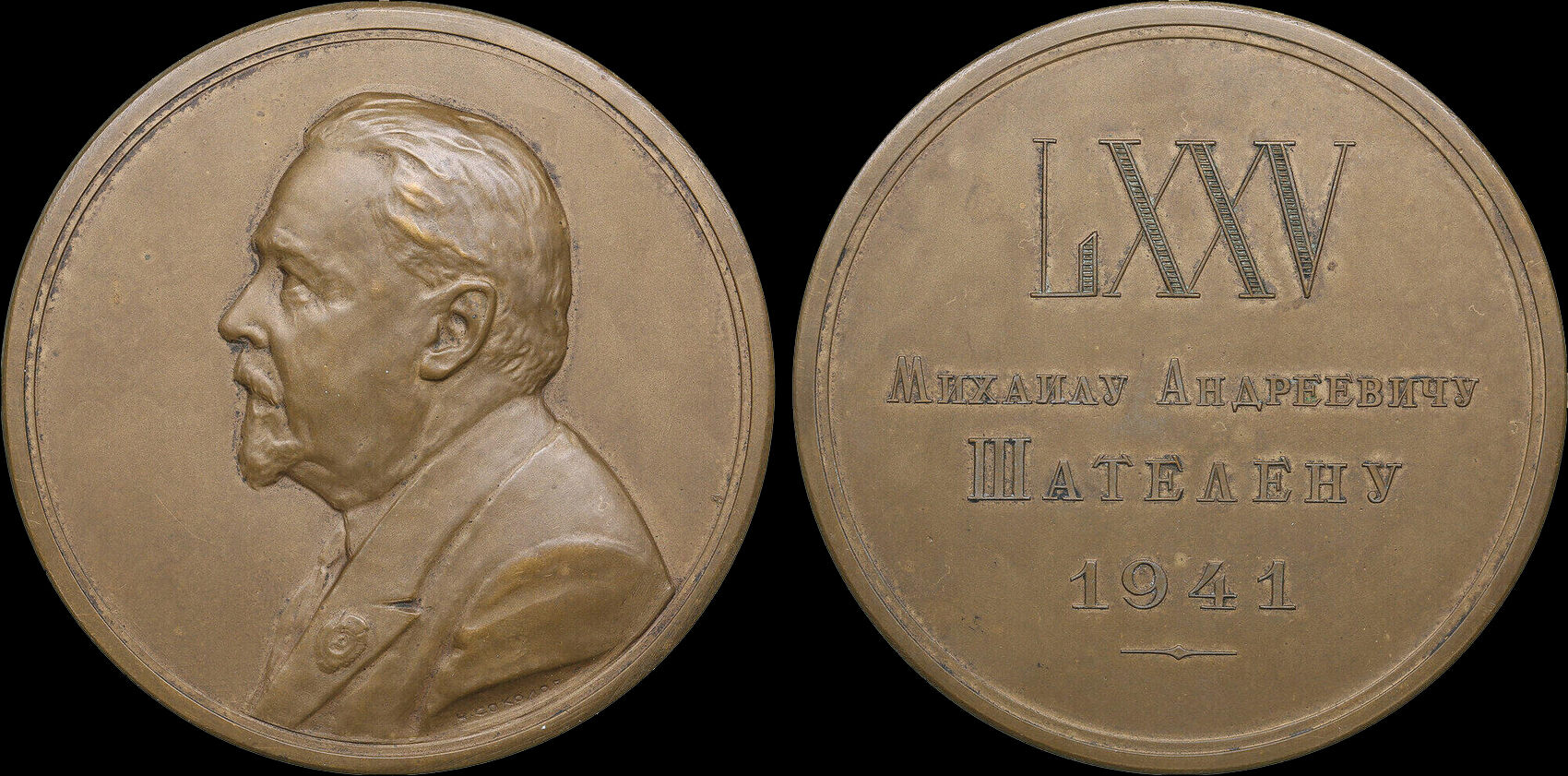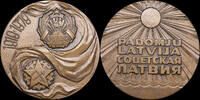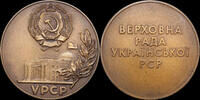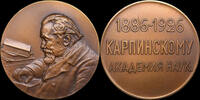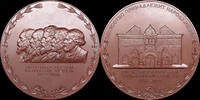MA-号码: 606002090
USSR / Russia 1941 75 years since the birth of Mikhail A. Shatelen UNC
Diameter 68 mm. Minted 500 pc. Шкурко, Салыков# 63.
"75 лет со дня рождения М.А.Шателена"
N.A. Sokolov.
Mikhail Shatelen: A Pillar of Soviet Electrical Engineering
Mikhail Andreevich Shatelen, born on January 13, 1866, in Anapa, Russia, and passing away on January 31, 1957, in Leningrad, was a towering figure in the field of electrical engineering during the Soviet era. His contributions spanned across education, research, and the practical application of electrical technologies, making him a cornerstone in the development of Soviet technological infrastructure.
Educational Journey and Academic Career
Shatelen's academic path began at St. Petersburg University, where he graduated in 1888, followed by further specialization in Paris at the Higher Electrical Engineering School. His return to Russia saw him quickly rise through academic ranks. By 1891, he was already part of the teaching staff at St. Petersburg University and the Mining Institute, later becoming a professor at the St. Petersburg Electrical Engineering Institute. His commitment to education was further exemplified by his foundational role in establishing the St. Petersburg Polytechnic Institute, where he taught from 1901 until his death, influencing generations of engineers.
Contributions to Science and Technology
Shatelen's work was not confined to the classroom. He was deeply involved in the GOELRO plan, a monumental project for the electrification of Russia, which he helped develop and implement. This plan was pivotal in modernizing the Soviet Union's infrastructure, aiming for comprehensive electrification to boost industrial and agricultural productivity. His involvement in this project underscores his practical engineering prowess alongside his academic achievements.
Awards and Recognition
His contributions did not go unnoticed. Shatelen was honored with the title of Hero of Socialist Labor in 1956, reflecting his significant impact on Soviet society. He was also a corresponding member of the Academy of Sciences of the USSR from 1931, and his work earned him the Stalin Prize in 1949, among other accolades. These honors were not just for his technical contributions but also for his books, like "Russian Electrical Engineering of the XIX Century," which provided historical context and insights into the development of electrical engineering in Russia.
Legacy
Mikhail Shatelen's legacy is multifaceted. As an educator, he shaped the minds that would lead Soviet technological advancements. As a researcher and engineer, his work on metrology, illuminating engineering, and electrical engineering standards set the groundwork for future developments. His role in the GOELRO plan symbolizes his commitment to national development through technological innovation.
Conclusion
Mikhail Shatelen's life and work epitomize the blend of academic rigor with practical application in the service of national progress. His dedication to education, his pioneering work in electrical engineering, and his role in one of the Soviet Union's most ambitious projects make him not just a historical figure but a visionary whose contributions continue to resonate in the field of electrical engineering.
"75 лет со дня рождения М.А.Шателена"
N.A. Sokolov.
Mikhail Shatelen: A Pillar of Soviet Electrical Engineering
Mikhail Andreevich Shatelen, born on January 13, 1866, in Anapa, Russia, and passing away on January 31, 1957, in Leningrad, was a towering figure in the field of electrical engineering during the Soviet era. His contributions spanned across education, research, and the practical application of electrical technologies, making him a cornerstone in the development of Soviet technological infrastructure.
Educational Journey and Academic Career
Shatelen's academic path began at St. Petersburg University, where he graduated in 1888, followed by further specialization in Paris at the Higher Electrical Engineering School. His return to Russia saw him quickly rise through academic ranks. By 1891, he was already part of the teaching staff at St. Petersburg University and the Mining Institute, later becoming a professor at the St. Petersburg Electrical Engineering Institute. His commitment to education was further exemplified by his foundational role in establishing the St. Petersburg Polytechnic Institute, where he taught from 1901 until his death, influencing generations of engineers.
Contributions to Science and Technology
Shatelen's work was not confined to the classroom. He was deeply involved in the GOELRO plan, a monumental project for the electrification of Russia, which he helped develop and implement. This plan was pivotal in modernizing the Soviet Union's infrastructure, aiming for comprehensive electrification to boost industrial and agricultural productivity. His involvement in this project underscores his practical engineering prowess alongside his academic achievements.
Awards and Recognition
His contributions did not go unnoticed. Shatelen was honored with the title of Hero of Socialist Labor in 1956, reflecting his significant impact on Soviet society. He was also a corresponding member of the Academy of Sciences of the USSR from 1931, and his work earned him the Stalin Prize in 1949, among other accolades. These honors were not just for his technical contributions but also for his books, like "Russian Electrical Engineering of the XIX Century," which provided historical context and insights into the development of electrical engineering in Russia.
Legacy
Mikhail Shatelen's legacy is multifaceted. As an educator, he shaped the minds that would lead Soviet technological advancements. As a researcher and engineer, his work on metrology, illuminating engineering, and electrical engineering standards set the groundwork for future developments. His role in the GOELRO plan symbolizes his commitment to national development through technological innovation.
Conclusion
Mikhail Shatelen's life and work epitomize the blend of academic rigor with practical application in the service of national progress. His dedication to education, his pioneering work in electrical engineering, and his role in one of the Soviet Union's most ambitious projects make him not just a historical figure but a visionary whose contributions continue to resonate in the field of electrical engineering.
Info / FAQ
| Shipping fees | ||||
|---|---|---|---|---|
| 8.32 元 to 415.83 元 | 415.83 元 to 1,663.33 元 | 1,663.33 元 to 4,158.32 元 | over 4,158.32 元 | |
| China | 99.80 元 | n/a | n/a | n/a |
| Germany | 41.58 元 | 41.58 元 | 41.58 元 | 124.75 元 |
| Estonia | 41.58 元 | 41.58 元 | 41.58 元 | 99.80 元 |
| United Kingdom | 41.58 元 | 41.58 元 | 41.58 元 | 207.92 元 |
| United States | 41.58 元 | 41.58 元 | 41.58 元 | 332.67 元 |
| European Union | 41.58 元 | 41.58 元 | 41.58 元 | 207.92 元 |
| World | 99.80 元 | 124.75 元 | 831.66 元 | 831.66 元 |
Information
Online orders are welcome as always and will be shipped directly.
|
商店主页 | 0购物车 | 使用条件 | 联系 | MA 使用条件 | 隐私声明 | 保证期 | MA-Shops 新商品 Copyright ® 2001-2025, MA-SHOPS Coins All Rights Reserved. Designated trademarks and brands are the property of their respective owners. |
 Buy coins with warranty
Buy coins with warranty +49 (0)2871 2180 383
+49 (0)2871 2180 383 


